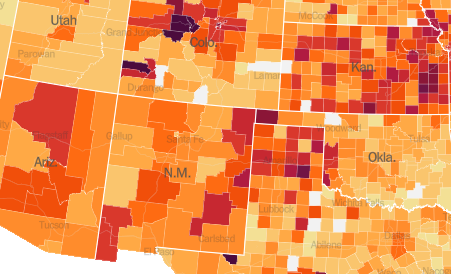
The New Year is here, and the New Mexico Department of Health (NMDOH) has some good advice. “Look out for one another. Protect your family…by getting your COVID-19 vaccine,” states the department on its Twitter page.
This simple but very important message should be taken seriously. Healthcare professionals worldwide advocate getting the two-jab series, after which a booster is recommended. These actions will protect you, your loved ones, your coworkers and your community from coronavirus infection. Statistics confirm that, although not fail safe, the vaccinated are much less likely to contract coronavirus than those who are not vaccinated.
Even former US President Donald Trump, who earlier admitted to Bill O’Reilly of Fox News that he received a booster shot, is taking heed that vaccinations work. In a before Christmas interview with Candace Owens, Trump pointed out that the virus is affecting the unvaccinated more seriously than the vaccinated. Mr. Trump said, “The ones that get very sick and go to the hospital are the ones that don’t do the vaccine, but it’s still their choice….And if you take the vaccine you’re protected, the results of the vaccine are good.”

The Omicron Variant
According to CNN’s Dr. Sanjay Gupta, thousands of coronavirus variants have emerged since the beginning of the pandemic. They mutate constantly, and “once they reach the body they replicate and evolve….Only a small handful change the virus in a way that can impact us adversely,” states Dr. Gupta.
The Omicron variant falls into the category of those that can affect us negatively. According to the New York Times, coronavirus cases are skyrocketing as a result of the Omicron variant. Still, even though Omicron, because of its transmissibility, is generating many cases, evidence suggests that it may be “causing less severe illness.” states Dr. Gupta.
According to CNN, coronavirus highs like the ones that are being seen today have not been around since earlier this year in January. The Omicron variant has burrowed itself into all 50 US states in a period of less than 30 days, and Lea County is no exception.
According to the Centers for Disease Control (CDC), the Omicron variant accounted for 73.2 percent of US COVID-19 cases for the week ending December 18. Predictions are that this figure will continue to rise and that COVID-19 is not going away anytime in the near future.
A Word of Caution About Omicron
William Hanage, associate professor of epidemiology and co-director of the Center for Communicable Disease Dynamics at the Harvard T.H. Chan School of Public Health, comments that the health care community and the general public are very likely underestimating the Omicron variant. “Barely a month after it was discovered, there’s still quite a bit we don’t know about omicron. The three key areas to focus on are transmissibility, disease severity and immune evasion, Hanage says.
According to Hanage, a “mild” case often makes people feel “miserable, even bedridden, for days”. When people cannot go to school or to work “enormous societal disruption” can result, “especially while we’re experiencing labor shortages and supply-chain problems.”
Additionally, the risk of “long covid” is very real. It can cause “physical and cognitive issues for many weeks and months after recovery from the acute phase of illness,” states Hanage. Little is yet understood about “long covid” other than it is very real, even though the pandemic has been around for not quite two years.
Omicron and Common Cold Symptoms Similar
Research shows that the Omicron variant has “a genetic code from the common cold inside of it.” Some people infected with the Omicron variant have experienced symptoms like those of the common cold.
- Nausea
- Light Temperatures
- Headaches
- Sore Throats
- Light Fevers
- Loss of Appetite
However, numerous Omicron variant symptoms “resemble other COVID-19 symptoms. In fact, the most common omicron variant symptoms so far include muscle aches, fatigue, scratchy throat and night sweats, which are not overly severe, “ states an article at DesertNews.com. Additionally, loss of taste is sometimes associated with the Omicron variant.
You Can Help
All can “help curb the spread [of coronavirus]….Masks, hand washing, physical distancing, good ventilation. They all still work. And while some of these variants have been shown to evade vaccines to some extent, research shows that even with a breakthrough infection, vaccinated people aren’t as likely to get as sick with COVID-19,” states Dr. Gupta.
Testing and self-isolation, especially after possible exposure, are additionally crucial to curbing the spread of coronavirus. If a positive test results quarantine is necessary.
However, the CDC has changed its quarantine recommendation. The organization now recommends that people with COVID quarantine for only five (5) days instead of 10. “[CDC] officials said the guidance is in keeping with growing evidence that people with the coronavirus are most infectious in the two days before and three days after symptoms develop.,” states an article at the GlobalNews website.
Experts are worried by the number of individuals becoming infected. These numbers threaten the “ability of hospitals, airlines and other businesses to stay open.” say healthcare experts. These numbers threaten the economy of Lea County, as well as those of the state and the nation.
Please do your part to help wipe out the spread of COVCID-19. Be proactive. Get vaccinated. Follow advisories of local, state and national health officials.
Photo Dhaya Eddine Bentaleb // Unsplash


